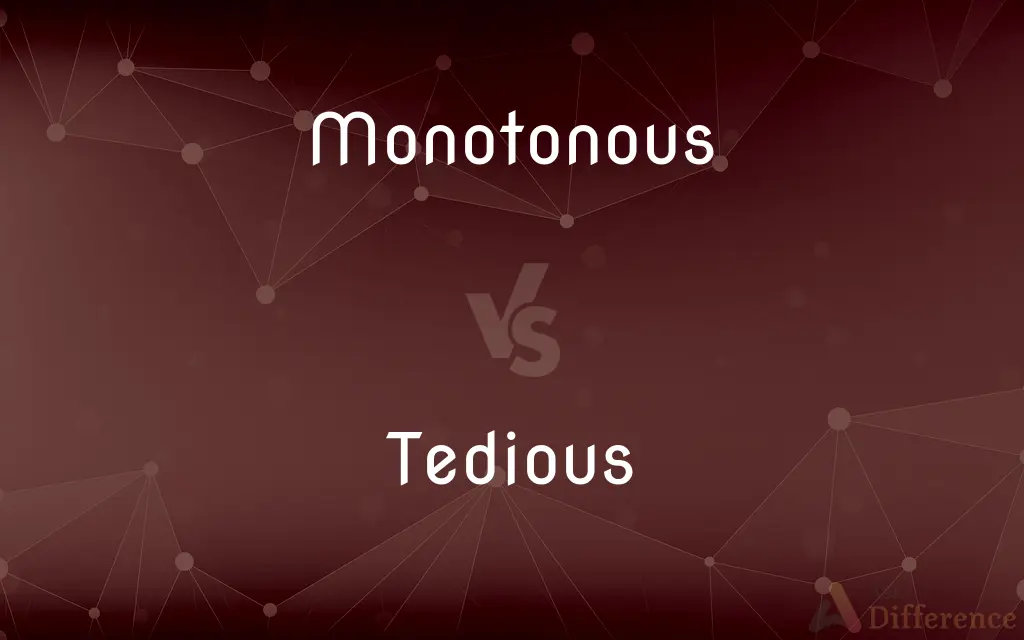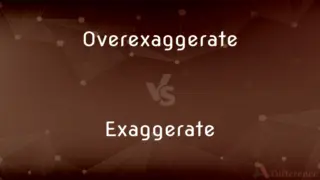Monotonous vs. Tedious — What's the Difference?
By Tayyaba Rehman & Urooj Arif — Updated on April 1, 2024
Monotonous involves repetition that leads to boredom, focusing on lack of variety; tedious implies tasks are boring and too prolonged, stressing on time and effort.

Difference Between Monotonous and Tedious
Table of Contents
ADVERTISEMENT
Key Differences
Monotonous activities are characterized by a lack of variety and change, leading to boredom because of repetition. For example, a job that involves performing the same task every day can be described as monotonous. On the other hand, tedious tasks might include variety but are perceived as overly long, detailed, or difficult, making them tiresome and boring. For instance, filling out lengthy paperwork can be tedious, even if each form is different.
While monotonous tasks can become tedious, the key difference lies in the reason for the discomfort. Monotony stems from repetition and predictability, which can make time seem to slow down and sap one’s enthusiasm. Conversely, tediousness often results from the effort, complexity, or time required to complete tasks, regardless of repetition, which can overwhelm or bore someone.
The feeling of monotony is often associated with a passive experience, where one might feel trapped in a cycle of sameness. This can lead to a lack of stimulation and motivation. Whereas, tediousness involves an active engagement in a task that feels overwhelmingly dull or unnecessarily complicated, which requires more mental and sometimes physical effort.
In addressing these feelings, breaking up the monotony might involve introducing changes or variations to routines or tasks. While to mitigate tediousness, finding ways to simplify the task, break it into smaller, more manageable parts, or understanding its purpose can help make it more bearable.
Both monotonous and tedious tasks have the potential to impact mental well-being and productivity. While monotonous tasks can lead to disengagement and a lack of creativity, tedious tasks can cause frustration, stress, and burnout. It's important for individuals and organizations to recognize and address the sources of both to maintain motivation and efficiency.
ADVERTISEMENT
Comparison Chart
Definition
Lacking in variety and interest.
Long, slow, and dull; overly prolonged.
Cause
Repetition and predictability.
Complexity, length, or difficulty.
Feeling
Boredom due to sameness.
Irritation or weariness from effort.
Engagement
Passive experience.
Active but unwelcome engagement.
Solutions
Introducing variety or change.
Simplifying or breaking down tasks.
Impact on Time
Makes time feel slower.
Associated with the effort over time.
Mental Effect
Can lead to lack of stimulation.
Can cause stress and frustration.
Compare with Definitions
Monotonous
Characterized by unvarying pitch or tone.
He delivered his speech in a monotonous voice that put half the audience to sleep.
Tedious
Boring because of over-complexity or length.
The lecture was tedious, filled with unnecessary jargon and tangents.
Monotonous
Continuously the same, leading to a lack of excitement.
Walking the same route every day became monotonous.
Tedious
Requiring too much time, effort, or attention to detail.
The tedious process of documenting every step was necessary but frustrating.
Monotonous
Repetitive and unchanging, leading to disinterest.
The job's monotonous tasks made her crave for something more challenging.
Tedious
So lengthy or detailed as to become tiresome.
Compiling the annual report was a tedious task that took weeks to complete.
Monotonous
Lacking in variety, causing boredom.
The monotonous beep of the machine was soothing at first, but quickly became irritating.
Tedious
Involving more effort than is warranted by the outcome.
The tedious paperwork involved in filing the claim made him question if it was worth it.
Monotonous
Predictably dull, with no surprises.
The novel's plot was monotonous, with no twists to engage the reader.
Tedious
Demanding considerable patience and concentration.
Painting miniatures is a tedious hobby, requiring a steady hand and lots of patience.
Monotonous
Sounded or spoken in an unvarying tone
A monotonous droning voice.
Tedious
Too long, slow, or dull; tiresome or monotonous
A tedious journey
Monotonous
Tediously repetitious or lacking in variety.
Tedious
Tiresome by reason of length, slowness, or dullness; boring.
Monotonous
Having an unvarying pitch or tone.
Tedious
(Obsolete) Moving or progressing very slowly.
Monotonous
Tedious, repetitious, or lacking in variety.
Tedious
Boring, monotonous, time-consuming, wearisome.
Monotonous
Uttered in one unvarying tone; continued with dull uniformity; characterized by monotony; without change or variety; wearisome.
Tedious
Involving tedium; tiresome from continuance, prolixity, slowness, or the like; wearisome.
I see a man's life is a tedious one.
I would not be tedious to the court.
Monotonous
Sounded or spoken in a tone unvarying in pitch;
The owl's faint monotonous hooting
Tedious
Using or containing too many words;
Long-winded (or windy) speakers
Verbose and ineffective instructional methods
Newspapers of the day printed long wordy editorials
Proceedings were delayed by wordy disputes
Monotonous
Tediously repetitious or lacking in variety;
A humdrum existence; all work and no play
Nothing is so monotonous as the sea
Common Curiosities
What defines a task as monotonous?
A task is defined as monotonous if it involves repetition and lacks variety, making it boring and unengaging.
Why are tedious tasks frustrating?
They require more effort and time than what seems justified, leading to frustration and weariness.
What makes a task tedious?
A task is considered tedious if it is overly long, detailed, or difficult, requiring considerable effort and time, leading to weariness or irritation.
How can one cope with monotonous tasks?
Introducing variety, changing routines, or adding elements of challenge can help cope with monotonous tasks.
What strategies can help deal with tedious tasks?
Breaking down the task into smaller parts, simplifying the process, or understanding its purpose can make tedious tasks more manageable.
How do monotony and tediousness affect productivity?
Both can decrease motivation and engagement, leading to lower productivity and potential burnout.
What is the role of creativity in addressing monotony and tediousness?
Creativity can offer new ways to approach or perceive tasks, making them more engaging and lessening feelings of monotony or tediousness.
Can a task be both monotonous and tedious?
Yes, a task can be both if it involves repetitive actions that also require a lot of time, effort, or attention to detail.
Is monotony always negative?
Not always; some people find comfort in routine and predictability, though extended monotony can lead to boredom.
How can organizations help employees with monotonous or tedious tasks?
By providing training for skill development, rotating tasks, encouraging breaks, and recognizing efforts, organizations can help manage these feelings.
Can changing the environment reduce the feeling of monotony?
Yes, changing the physical or social environment can introduce new stimuli, reducing the feeling of monotony.
Is there a psychological impact of prolonged exposure to monotony and tediousness?
Yes, prolonged exposure can lead to mental fatigue, stress, disengagement, and even depression.
Can technology help make monotonous or tedious tasks more bearable?
Technology can automate repetitive tasks or simplify complex ones, making them less monotonous or tedious.
What role does personal interest play in perceptions of monotony and tediousness?
Personal interest can greatly affect how one perceives a task; tasks aligned with one's interests are less likely to be seen as monotonous or tedious.
Share Your Discovery

Previous Comparison
Overexaggerate vs. Exaggerate
Next Comparison
Felt vs. FleeceAuthor Spotlight
Written by
Tayyaba RehmanTayyaba Rehman is a distinguished writer, currently serving as a primary contributor to askdifference.com. As a researcher in semantics and etymology, Tayyaba's passion for the complexity of languages and their distinctions has found a perfect home on the platform. Tayyaba delves into the intricacies of language, distinguishing between commonly confused words and phrases, thereby providing clarity for readers worldwide.
Co-written by
Urooj ArifUrooj is a skilled content writer at Ask Difference, known for her exceptional ability to simplify complex topics into engaging and informative content. With a passion for research and a flair for clear, concise writing, she consistently delivers articles that resonate with our diverse audience.















































